What is Sleep Apnea? from Flack Flores's blog
Sleep apnea is a severe disorder when breathing stops and starts during sleep. Left untreated, it could cause loud snoring, full-day tiredness, or severe problems like higher blood pressure and heart trouble. If you find any such condition, you can visita dentist near me.
The Link Between Sleep Apnea and Your Dentist
Are you struggling with snoring and sleeplessness? An urgent visit to your nearby Emergency Dental can help you. These are the common signs of obstructive sleep apnea, which may happen due to poor oral health.
This condition is different from regular snoring. Your dentist consultation will help you to differentiate between primary and sleep apnea problems. Your primary snoring is because of your nose and throat or sleeping style. You should visit a dds near meif you find any common symptoms.
Sleep apnea symptoms:
- Snoring louder than those regular ones
- Stop or Pause while breathing
- Take shallow breaths, gasp, or choke and be restless all the day
Types of Sleep Apnea
Obstructive sleep apneais one of the most common types of sleep apnea. It happens when your airways, after a time, become wholly or partially blocked during sleep, generally because your soft tissue collapses. In this process, your chest muscles work harder than usual to open your airways, And you may find louder gasps while breathing. This results in lower oxygen flow to your body parts and leads to abnormal blood pressure.
Usually, you won’t notice any signs of obstructive sleep apnea. But, your bed partner may be aware of of you. Here are the most common signs and symptoms of Obstructive sleep apnea:
- Snoring and fatigue or sleepiness the whole day
- Restlessness while sleeping, or continuous awakenings
- Dry and sore throat when you wake up
- Sudden Waking up after choking or gasping
- Low concentration or forgetfulness
- Depression or anxiety
- A constant peeing during sleeping
- Night sweating
- Sexual dysfunction or Headaches
Central sleep apnea is a type in which your airway doesn’t become blocked. Instead, your brain stops sending signals to your muscles, which becomes an issue in your respiratory control center. It’s related to the functioning of your nervous system. Central sleep apnea happens most often in people with neuromuscular disease such as amyotrophic lateral sclerosis (ALS, or Lou Gehrig’s disease), those with a stroke, or those with heart failure or other forms of heart, kidney, or lung disease.
People with central sleep apnea commonly say they wake up frequently or have insomnia. But they also feel choking or gasping sensations when they awaken. These symptoms are not common in children.
- Sluggishness or sleepiness
- Poor performance during the school
- Daytime continuous mouth breathing
- Inside movement of the rib cage when inhaling
- Too much sweating at night
- Unusual sleeping positions
- Bedwetting
Complex sleep apnea syndromeis the type in which your doctor found both obstructive and central sleep apnea. Doctors also call this type of sleep apnea treatment-emergent central sleep apnea.
Article Source : https://www.articleentry.com/what-is-sleep-apnea/



The Wall